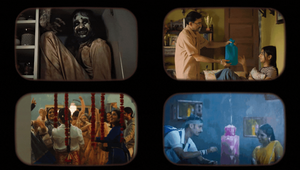
Binaifer Dulani: Organisations Give Titles, People Make You a Leader

Binaifer Dulani is an award-winning creative and founding partner at Talented. Previously, as creative director at Dentsu Webchutney, she led 'The Unfiltered History Tour', India’s most awarded campaign at Cannes Lion, earning multiple Grand Prix and the Titanium Lion.
In 2024, she was named South Asia Creative Leader of the Year by Campaign and featured in Impact magazine's 50 Most Influential Women in India. She is also a Cannes Lions Creative Director of the Year honouree and a See It Be It alum.
Her ground-breaking campaigns have addressed caste discrimination, preserved freedom fighters' legacies, and advanced intersectional feminism. Binaifer co-leads Indian Creative Women, a platform bridging gender gaps in leadership, and teaches at India’s top universities. A frequent juror for global awards, she is a vocal advocate for female filmmakers, championing diversity behind the camera while shaping the future of advertising and inspiring the next generation of creatives.
LBB> What was your first experience of leadership?
Binaifer> I now have the words for the unique familial system I had the opportunity to grow up in. It’s called a ‘locentric family’ – where the youngest in the household isn’t just heard but often at the centre of decision-making. It meant that I got to experience every season at home fully, not as something to be shielded from but as something to be a part of. Conversations on how we would navigate them happened openly, around me, with me. And yet, I never felt unsafe. The one constant was the quiet assurance that we were in it together.
I think about this a lot. About how those early years shaped my inner voice, how they trained my mind to stay steady when things got chaotic. From early on, I was also in charge of my own time – unsupervised, figuring things out while my parents came home after hours from work. Freedom like that forces you to trust yourself.
Maybe that’s why leadership at 23 didn’t feel like a moment as much as a continuation. Because by then, I had already been leading my own life for years. But it took the belief of my leaders – who continue to be such an incredible part of my life at Talented – to remind me that leadership doesn’t have to be loud to be real. That it can look like inherent shyness, soft-spokenness, and a tiny frame. That it can look like me. And I try to create the circumstances to pass that on every day.
LBB> How did you figure out what kind of leader you wanted to be – or what kind of leader you didn’t want to be?
Binaifer> At this point in my career, I hope to be a leader who, through all the rejection, volatility and self doubt that is second-nature to a creative career, lands on my feet… but has enough inner resilience in case I land on my head.
LBB> What experience or moment gave you your biggest lesson in leadership?
Binaifer> At Talented, I see our best leaders feeling entirely comfortable admitting when they don’t have the answer. There’s often this expectation that the leader should always know – but the truth is, the strongest ones understand that their role isn’t about having all the answers. It’s about facilitating the right conversations and guiding them towards meaningful outcomes, together.
Another thing leaders struggle with is changing their minds. There’s a pressure to stay consistent with the first stance they take, to avoid seeming indecisive. But real leadership is about openness – it’s about allowing new perspectives to shape your thinking. Being influenced by a good argument isn’t a weakness; it’s a strength.
The biggest lesson I’ve learned? Leadership isn’t about being the smartest person in the room. It’s about creating the conditions for the room to be as smart and sharp as it can possibly be.
LBB> Did you know you always wanted to take on a leadership role? If so how did you work towards it and if not, when did you start realising that you had it in you?
Binaifer> For anyone looking to accelerate their career toward leadership, the worst step isn’t about chasing titles – it’s about being coachable and sponsorable. You don’t find sponsors. Sponsors find you. And they do so because you show up, day after day, with humility, with the willingness to do the work, to persevere when it’s easier not to.
It’s true – women often find mentors who offer well-meaning advice. But mentorship isn’t always enough. What we really need are sponsors. The ones who don’t just guide you but actively create space for you. The ones who ensure you get that promotion, that raise – especially when there’s only one seat left at the table. Or better yet, the ones who extend the table.
I’ve been fortunate to have had sponsors who did that for me. And because of that, something shifted. Power stopped feeling like something that is morally corrupt and started feeling like something to wield well. Something that, in the right hands, could be a force for good. Sponsorship did more than accelerate my path to leadership – it shaped the kind of leader I want to be. The kind that doesn’t just take a seat but makes room for others too.
LBB> When it comes to 'leadership' as a skill, how much do you think is a natural part of personality, how much can be taught and learned?
Binaifer> Everyone is coachable.
As a psychology student, and from my own experiences, I’m a strong believer in Rosenthal’s theory. Essentially, people tend to perform in ways that align with the expectations others have for them.
If someone expects you to succeed, you might subconsciously try harder and, in turn, succeed. Leadership begins with seeing the best in people around you and believing they can succeed.
No one is lazy – everyone comes in red to do a good job – it’s on leaders to develop the circumstances for that to happen, and dig deep to really understand what’s getting in the way.
LBB> What are the aspects of leadership that you found most personally challenging? And how do you work through them?
Binaifer> You can get a title or a managerial position. But you cannot become a leader. That is something that happens to you, because an organisation can only give you a title, people make you a leader.
Every leader possibly goes through some shape of this feeling ‘I hope I’m taken seriously'. And sometimes, it can feel like your age, gender, how you look or speak, accent, fluency, are at odds with that. And so we overcompensate. Only to realise that the cliché about owning your story is the only way out. What we believe about ourselves radiates out, and so we ought to wear our stories with pride. Earlier on in my career, I wondered if I was too much of a ‘good girl’ only to realise how much it has held me in good stead.
LBB> Have you ever felt like you've failed whilst in charge? How did you address the issue and what did you learn from it?
Binaifer> There’s no escaping failure. Even world champion, Roger Federer who played 1526 singles matches, and won 80% of them, within those matches won only 56% points. Think about it, even a world champion got only half of the points.
So I always make it a point to remind myself this is one point – it does not determine who I am. And that allows me to come back again, instead of letting the shame of leading a team of A-players to less fortunate circumstances fully take over me, and question why I’m here in the first place.
LBB> As a leader, what are some of the ways in which you’ve prioritised diversity and inclusion within your workforce?
Binaifer> At Talented, our gender pay gap (mean average) has been moving within the range of -12% (very rare) to +3% over the year. This is a strong indication of women in senior, leadership positions and not just women filling the ranks. And that has an impact on everything. When there are more women in executive committees, it automatically creates consideration for everyone who lives in the margins of society, as part of internal policy.
And that influence seeps into the biggest moat we have to propel society in the right direction, our work – which has taken on caste discrimination, and been a champion of progressive womanhood.
LBB> How important is your company culture to the success of your business? And how have you managed to keep it alive with increases in remote and hybrid working patterns?
Binaifer> In our case, remote and hybrid working models are core to the success of our company culture. Working remotely means we’re inherently built on a sense of trust.
You can be anywhere you choose to be, but you can show careful consideration for your colleagues by overcommunicating, and relying on shared written information on our all-hands and spaces.
Folks often drop messages like ‘at the dentist’ or ‘focus mode – not taking meetings’ during working hours, only for the entire organisation to drop a volley of emojis. It means that it’s perfectly fine to get a haircut on a Monday morning, as long as you have an overall sense of ownership.
This sense of ‘no one needs to be surveilled’ because the people we work with set high standards for themselves is the cornerstone of our success as an agency.















